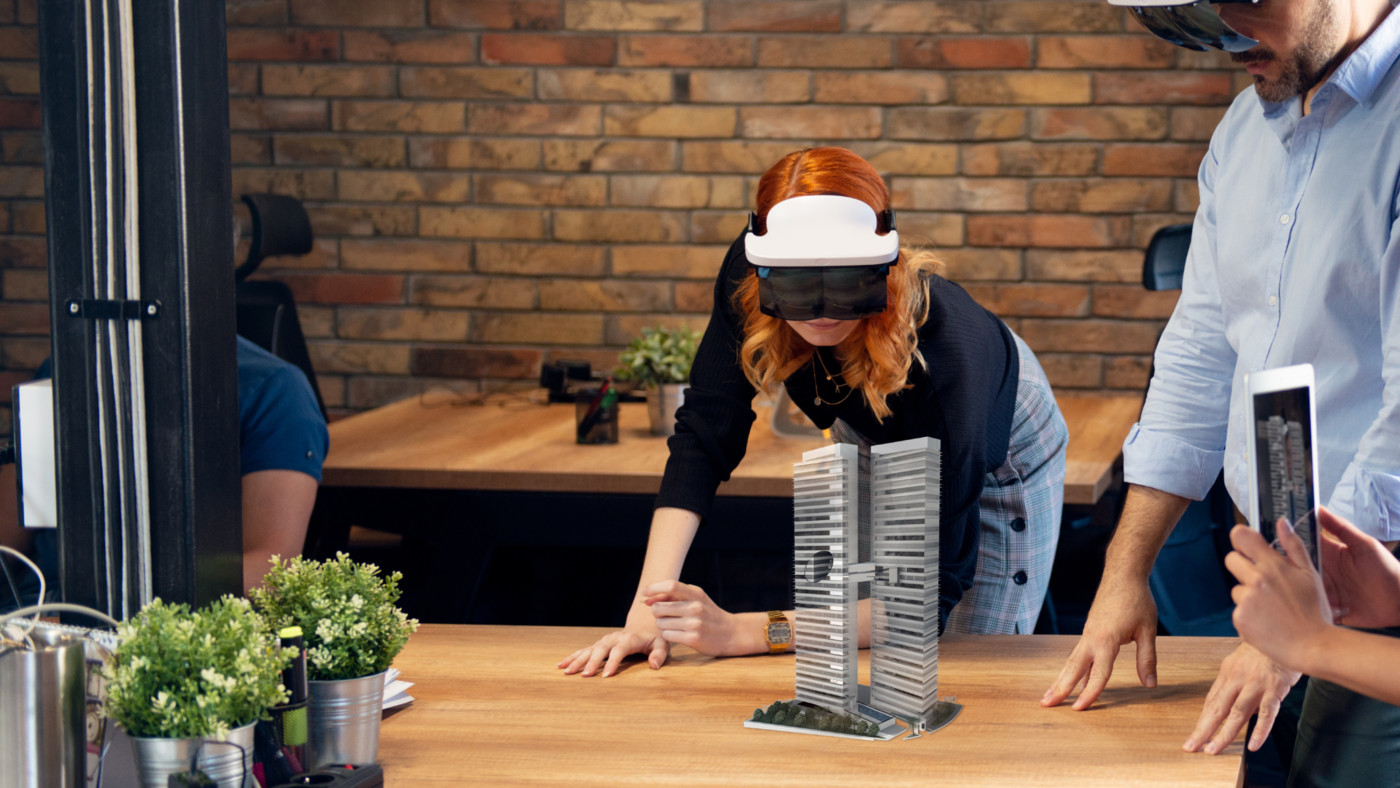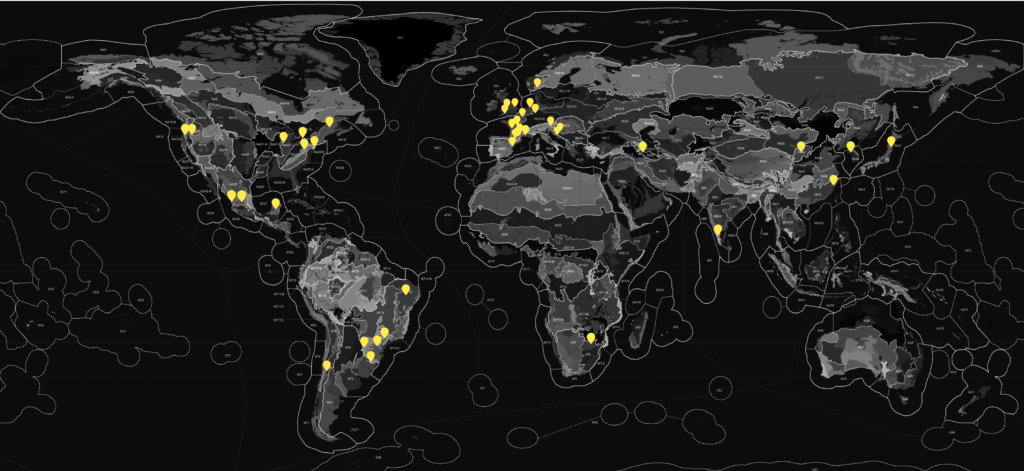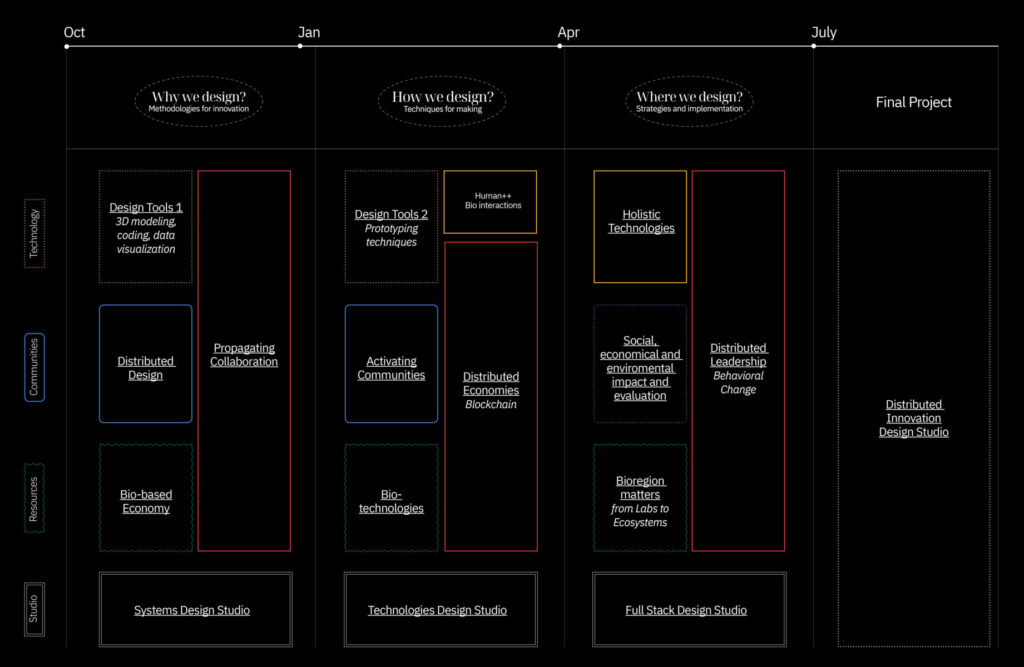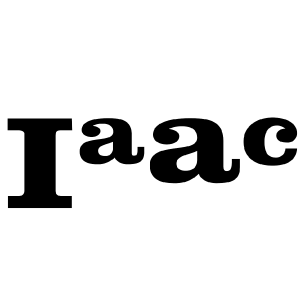
Master in Design for Distributed Innovation – MDDI
A hybrid learning program approaching design in a new way
The Master in Design for Distributed Innovation (MDDI) is a distributed learning program focused on the intersection of design, technology, ecosystems and communities to improve interspecies wellbeing. It connects a global community of changemakers with local innovators in order to address complex challenges. Combining online and hands-on learning, it supports the development of the social and technical skills needed to develop projects for positive impact in local communities that aim for global transformational change.
Degree
Master in Design for Distributed Innovation accredited by University of Lleida (UdL) – European Higher Education Area (EHEA)
Edition
PROGRAM NOT ACTIVE
Credits
60 ECTS
Duration
PROGRAM NOT ACTIVE
Format
Distributed and Hybrid
Language
English
Location
Worldwide. Online and in-person in association with participating nodes globally, Fab Labs and Fab Cities
Tuition Fee
12.000 EUR
* Tuition fee includes a non-refundable program enrollment fee of 2.800€
Applications Deadline
February 29, 2024
Admissions Requirements
Bachelor or higher degree in Industrial Design, Product Design, Architecture and Urban Design, Graphic Design, Interaction Design, Computer Science, Engineering (Mechanical, Chemical, Product, Material), Sociology, Anthropology, Economy, and other related professions.
A remote and on-site hybrid program
MDDI presents the next frontier in global impact education. As a distributed program, students will experience a mix of online seminars with in-person mentorships and the production of physical prototypes in their local nodes. The program is structured in three modules of one trimester each, plus a final project implementation. Each module focuses on different levels of the Fab City Full Stack, across three tracks: Ecosystems, Communities and Technology.

Structure
As a distributed program, MDDI students will experience a mix of online seminars with in-person mentorships and the production of physical prototypes in their local nodes. The program is structured in three modules of one trimester each, plus a final project implementation during one month. Each module focuses on a pair of levels of the Fab City Full Stack, which are developed in three tracks: Ecosystems, Communities and Technology.

Module 1: Why we design?
The aim of this module is to establish a foundational layer of understanding the implications of design in its collaboration with communities, human and nonhuman agents, by giving students methodological tools to develop valuable and meaningful scalable systems. With a focus on the development of new learning skills for designing the future and how to enable impact-based incubations at local scales, based on distributed design, collaboration, biomass economy and digital tools.
Module 2. How to design?
This module focuses on developing technical skills to develop sustainable and innovative solutions based on the reconfiguration of technology, social dynamics and resources. Focusing on developing shared urban and territorial strategies, cultivating networks of communities and cities, based on bio-technologies, bio and digital fabrication, bio interactions and blockchain.
Module 3. Where to design?
In this final module, students will be introduced to different but integrated strategies of applying, developing and leading innovative projects in an economic, social, and environmental regenerative manner, achieving a bioregional impact. By developing skills related to impact evaluation, integrative technologies, multiscale layering and horizontal leadership.
Professional Opportunities
The program offers innovators and changemakers the opportunity to address global challenges in their working and living contexts to enable local transformation, by learning from and adapting global knowledge. MDDI graduates will have the possibility to integrate the knowledge acquired in the program in their working environments, or expand their research agenda after the program. At the same time, graduates with an existing business or initiative linked to the purpose of the program will have the opportunity to reinforce and scale up their reach, and incorporate new knowledge in their current mission. An MDDI graduate might change or develop a new department within their organization, or find work as Head of Innovation, Director of Strategic Design, Head of Research and Development, CEO of their own startup, or lead transformation projects in public and civil organizations.
Student Profile
As a MDDI candidate, participants might be already working in the public or private sector, academic institutions or, may come from an entrepreneurial background having started their own business related to planetary restoration. The program aims to become a platform to boost and accelerate students’ capabilities to produce change in their own contexts, and to accelerate the transition towards a productive and sustainable model of production and consumption in their communities.
Creative industries & makers
Designers, Makers, Architects, Urbanists and Artists who want to expand their knowledge by incorporating new design methodologies, technological skills and theoretical arguments to deploy in their personal and professional projects sustainably.
Entrepreneurs, social Innovators
Professionals from all areas who wish to transform their ideas into social innovations or start their sustainable entrepreneurship by expanding their technical skills and design methods to become agents of positive change.
Government employees and NGOs
Professionals who are already making changes from inside in public services or non-governmental-organisations and want to accelerate the impact of policy by adopting a sustainable innovation culture.
Nodes, Fab Labs & Maker Spaces
The in-person learning experiences are imparted across the world in local nodes, Fab Labs or maker spaces, which become the physical spaces where students gather, meet their local instructors, join online classes together, prototype their ideas and develop their weekly assignments and projects.
+ Contact the Master’s coordinator to check what are the current nodes.
+ Check here if there’s a Fab Lab in your city
+ If your city or closest Fab Lab is not on the list, let us know where you live so we can support you in finding the nearest maker space.
Fab City Global Initiative
MDDI is designed using the Fab City Full Stack, a multiscale approach outlined by the Fab City global initiative. This layered approach forms the basis of the program, framing the methodological approach to conceptualizing transformational change.
+ Check more about this here
Partners
Founded in 2014 as a spinoff of the Global Fab Lab Network and Fab Lab Barcelona, Fab City Foundation coordinates a global network of 41 cities that pursue a shift away from the linear industrial paradigm of linear production and consumption of our cities, based on the import of products that generates trash (PITO: Product-in Trash-out), by enabling the return of manufacture to cities supported by a circular and local productive model, based on digital technologies and information (DIDO: Data-in Data-out). Fab City is expanding the impact of the Fab Lab Global Network of more than 2,500 Fab Labs distributed in the five continents supporting this change in the scale of production, by providing the physical infrastructure to produce locally (almost) everything. At the same time, by connecting highly technical trained people with communities for knowledge transfer and prototyping capacities.
The first Fab Lab funded in the European Union in 2007, is situated inside the Institute for Advanced Architecture of Catalonia (IAAC). Fab Lab Barcelona is a founding member and one of the first locations of the global distributed education program, Fab Academy. As part of the transition into Industry 4.0 and leading the Fab City initiative, Fab Lab Barcelona focuses on the human-scale and the everyday experience, identifying opportunities in rising trends across seven strategic areas of expertise including Distributed Design and Future Learning.
Institute for Advanced Architecture of Catalonia – IAAC
The Institute for Advanced Architecture of Catalonia (IAAC) is a centre for research, education, production and outreach, with the mission of envisioning the future habitat of our society and building it in the present. IAAC follows the digital revolution at all scales (from bits to geography, from micro-controllers to cities, from materials to the territory) to expand the boundaries of architecture and design and meet the challenges faced by humanity. IAAC is an experimental and experiential centre where one learns by doing, through a test methodology that promotes real solutions. IAAC is an open, independent and radical non-profit foundation, with 20 years of activity; inspired by the values of Barcelona, the capital of architecture and design, where urbanism was invented and where local high quality and innovation-oriented research is connected to an international network of excellence in technology, architecture and society fields.
